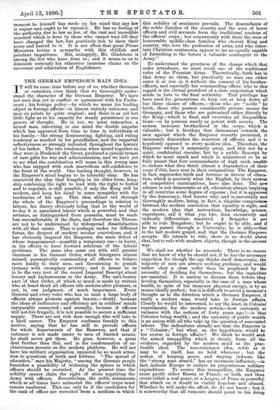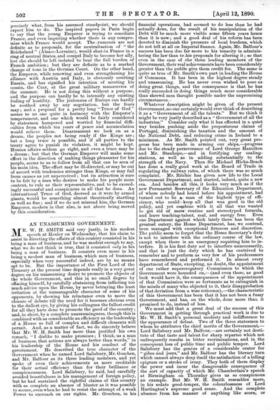THE GERMAN EMPEROR'S MAIN IDEA.
IT will be some time before any of us, whether Germans or outsiders, even think that we thoroughly under- stand the character of the German Emperor. We have not seen him yet in conflict or agreement with his Parlia- ment; his foreign policy—by which we mean his leading object in foreign affairs—is almost entirely unknown, and may on points be quite original ; and there is as yet but little light as to his capacity for steady persistence in one groove of thought. He is, too, we must remember, a mixed man, inheriting in one mind the double impulse which has appeared from time to time in individuals of his family,—the strong domineering, fighting, and ruling tendency so marked in his grandfather, and. the impartial reflectiveness so strongly indicated throughout the history of his father. The two tendencies, when mixed together as they were in Frederick the Great, produced a cynical tyrant of rare gifts for war and. administration, and we have yet to see what the combination will mean in this young man who has stepped with such marvellous self-confidence to the front of the world. One leading thought, however, in the Emperor's mind begins to be tolerably clear. He has conceived the idea that kingship in its older form, king- ship combining the right to lead with the right to forbid and to regulate, is still possible, if only the King will be modern, and keep his mind in some sympathy with the tendencies of his age. This idea shines out through the whole of the Emperor's proceedings in relation to labour, his theory obviously being that in the world of to-day it is associated labour which is powerful, and that artisans, as distinguished from peasants, must be made less uncomfortable if the State, and therefore the Throne, are not to be undermined. by widespread dissatisfaction with all that exists. That is perhaps, under its different forms, the deepest of modern secular convictions, and it has obviously inspired the Emperor, the main defect of whose temperament—possibly a temporary one—is burry, in his efforts to force forward solutions of the labour problems. The same idea came out with still greater clearness in his General Order, which foreigners almost missed, peremptorily commanding all officers to behave more kindly to their men, and, threatening to punish tyranny with exemplary severity; and it seems to us to be the very root of the recent Imperial Rescript about luxury and exclusiveness in the Army. The anti-luxury part of that Order, of which so much is made by writers who at heart think all officers idle seekers after pleasure, is not, in our judgment, of much importance. Every General and every ruler who has to raise a large body of officers always protests against luxury,—firstly, because the ideas of endurance and efficiency are in soldiers' minds inseparably connected ; and secondly, because if officers will not live frugally, it is not possible to secure a sufficient supply. There are not rich men enough who will take to a hard career. The Emperor confesses frankly to this motive, saying that he has still to provide officers for whole departments of the Reserves, and that if entrance is not made easier to men of limited means, he shall never get them. He goes, however, a great deal further than this, and in his condemnation of ex- clusiveness mounts on the modern platform. He will not have his military organisation impaired by so much atten- tion to questions of birth and fortune. "The spread of education," says his Majesty, "among the German people furnishes a possibility of widening the sphere in which officers should. be recruited. At the present time the nobility cannot claim the right of alone supplying the Army with officers. Nevertheless, the noble sentiments which at all times have animated the officers' corps must remain unaltered. This can only be if the candidates for the rank of officer are recruited from a medium in which this nobility of sentiment prevails. The descendants of the noble families of the country and the sons of brave officers and civil servants form the traditional nucleus of 'the officers' corps ; but concurrently with these the sons of honourable middle-class families who cherish King and country, who love the profession of arms, and. who enter- tain Christian sentiments, appear to me as equally capable of furnishing in the future a valuable contingent to the Army."
To understand the greatness of the change which that order introduces, we must recall one of the traditional rules of the Prussian Army. Theoretically, birth has in that Army no claim, but practically no man can either enter it or rise in it without the consent of his brother- officers, and especially his commanding officer, who in this regard is the virtual president of a close corporation which sends in lists to the final authority. This privilege has been used for generations to keep out or keep down all but three classes of officers,—those who are " noble " by birth, those who possess considerable private means for Germany, and those who are patronised either directly by the King—which is final, and overrides all disqualifica- tions—or by persons nearly as potent with society. The system increases brotherhood in the corps, which is valuable ; but it develops that demeanour towards the men against which the Emperor recently protested, it immensely diminishes the reservoir of officers, and it is hopelessly opposed to every modern idea. Therefore, the Emperor sweeps it summarily away, and this not by a quiet, confidential circular, but by a public R,escript by which he must stand, and, which is understood to be so fully meant that four commandants of high rank, unable to endure what they think almost a degradation of their corps d'elite, have sent in their resignations. The Emperor, in fact, supersedes birth and fortune in favour of educa- tion, which is precisely what the English, by their system of competitive examinations, have also done. The new scheme is not democratic at all, education always implying in all countries some degree of expense ; but it is approved by the democracy, God. knows why, and is essentially and thoroughly modern, being, in fact, a singular compromise between the modern conviction that equality is right, and the modern idea that instruction, knowledge, science, expertness, call it what you like, does excessively and radically differentiate mankind. A Bengalee is not able to rule Bengalees ; but he ought to be able, and if he has passed through a University, he is able,—that is the last modern gospel, and that the German Emperor accepts. He intends to rule, there is no doubt about that, but to rule with modern objects, though in the ancient way.
We shall see whether he succeeds. There is no reason that we know of why he should not, if he has the necessary capacities, for though the age thinks itself democratic, the majority of men are always seeking guidance, and would rather obey a clear order than be perplexed by the necessity of deciding for themselves ; but the capacities are essential. It is useless to discuss them before they develop themselves, especially in the case of a man whose health, in spite of his immense physical energy, is by no means ideally perfect; but it is difficult to avoid a moment's thought as to the direction which a German Emperor, if really a modern man, would take in foreign affairs. Clearly he would be interested, to say the least, in Colonial experiments, for the modern notion—how curiously at variance with the notions of forty years ago !—is that Colonies bring wealth ; and the necessity of public wealth is an axiom with all who take up the question of associated labour. The indications already are that the Emperor is a " Colonist ; " but what, on the hypothesis, would be his course in foreign affairs ? We think he would seek the armed tranquillity which is clearly, from all the evidence, regarded by the modern mind as the prac- ticable ideal. The non-resistance idea, noble as it may be in itself, has no hold whatever ; but the notion of keeping peace, and staying indoors, like the "strong man armed," has an enormous influence,—in fact, induces Europe to endure its preposterous military expenditure. To secure this tranquillity, the Emperor must pacify either Russia or France, or both, and thus create either a real peace, or a. League of Peace so powerful that attack on it would be visibly hopeless and absurd. Whether he will make the effort, we do not know ; but it is noteworthy that all rumours should point to his doing precisely what, from his assumed standpoint, we should expect him to do. The inspired papers in Paris begin to say that the young Emperor is trying to conciliate France, and even inquiring whether there is any compro- mise which France would accept. The .rumours are not definite as to proposals, for the neutralisation of "the Reichsland " (Alsace-Lorraine), would shut-in France in a ring of neutral States, and compel Italy to become her ally, lest she should be left isolated to bear the full burden of French ambition; but they, are definite as to a marked change of tone in the German Court. On the other hand, the Emperor, while renewing and even strengthening his alliance with Austria and Italy, is obviously courting Russia, and has signified his intention of meeting his cousin, the Czar, at the great military manoeuvres of the summer. He is not doing this without a purpose, and the purpose can hardly be to intensify any existing feeling of hostility. The jealousies of Europe can hardly be soothed away by any negotiation, but the fears may ; and a proposal for a pretty long "Truce of God" seems to us one quite in harmony with the Emperor's temperament, and one which would be fairly considered by statesmen hampered and worried by financial diffi- culties from which ten years of peace and accumulation would relieve them. Disarmament we look on as a dream, the peoples not being ready if the Kings are ; but a long truce is possible, and if all parties to the treaty agree to punish its violation, it might be kept. Human affairs seldom go right, and even a truce may be a dream ; but that the German Emperor will make some effort in the direction of making things pleasanter for his people, seems to us to follow from all that can be seen of his main idea. The effort may be ill-directed, or may be out ef accord with tendencies stronger than Kings, or may fail from causes as yet unperceived;, but its attraction is sure to be felt by a man who desires to make his people more content, to rule as their representative, and to be exceed- ingly successful and conspicuous in all that he does. An international Truce of God, decreed as it were by armed giants, would be something almost theatrically startling as well as fine ; and if we do not misread him, the German Emperor, modern in that also, is not above being moved by this consideration.



































 Previous page
Previous page